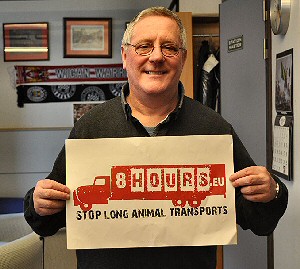|
NWAS Sees a Rise in Serious Cases

THE
North West Ambulance Service is seeing a surge in the number of 999
calls for people with serious life-threatening illnesses and is
urging people to ensure they have the right medications and look
after themselves and their neighbours during the cold snap.
Regionally, this week the Service has seen a 13.4% increase in calls
classed as category A8; the most serious and life-threatening which
require a response of 8 minutes, compared to the same week, 5
December 2011 to 11 December 2011; the conditions being presented
are generally respiratory related which particularly affects the
under 16s and over 65s, both vulnerable groups.
Acting
Director of Operations, Derek Cartwright comments:- 'This time
of year is traditionally our busiest time, we have the annual party
season to contend with, but adding to this are the calls for help
from genuinely ill people which has dramatically increased.'These
kinds of incidents will obviously take priority as they are a
serious threat to life and so calls which are not urgent, may find
themselves waiting a little longer for an emergency response or,
once triaged by our system, could be passed onto NHS Direct."
The
greatest increase for life-threatening calls has come from Greater
Manchester with 16.7%, followed by Cumbria and Lancashire with 13.3%
and then Cheshire and Merseyside which has seen an increase of 10%.
Derek
adds:- "People should not be afraid to ring us if they need
emergency assistance and we would urge people who are on long-term
medication to ensure they renew their prescriptions regularly, take
them as prescribed and take care. If you qualify for a flu jab,
please speak with your GP. Keep warm, drink plenty of fluids. For
those with minor conditions, we ask that you consider what
alternatives there are such as your local pharmacy, GP or walk in
centre. We make sure our cars and houses are winter proof and
we need to do the same with our health. As well as de-icer for our
cars and salt for our paths, we should all have a well-stocked
medicine cabinet for the winter months with items such as
paracetamol, stomach powders, sore throat remedies and basic first
aid items."
|
Timeframe |
Area |
Total Number of Calls |
Number of Cat A Calls (A8 +
A19) |
|
05/12/11 – 11/12/11 |
NWAS – all
North West |
22,378 |
13,952 |
|
Greater
Manchester |
8997 |
5584 |
|
Cheshire
&Merseyside |
6862 |
4580 |
|
Cumbria &
Lancashire |
6519 |
3784 |
|
Timeframe |
Area |
Total Number of Calls |
Number of Cat A Calls (A8 +
A19) |
|
03/12/12 – 09/12/12 |
NWAS |
23,566 |
15,813 |
|
Greater
Manchester |
7960 |
6457 |
|
Cheshire &
Merseyside |
8263 |
5038 |
|
Cumbria &
Lancashire |
7343 |
4288 |
|
Area |
% Difference
Total Number 999 calls |
% Difference
Number Cat A Calls |
|
NWAS |
+5.31% |
+13.34% |
|
GM |
-11.53% |
+16.17% |
|
C&M |
+20.42% |
+10% |
|
C&L |
+12.64% |
+13.32% |
|
Christmas Costs the Average
Student £161

STUDENTS at university are planning to spend
an average total of £161 on Christmas this year according to a
recent survey by student money
website.
This is less than 1/3 of the national consumer average, as found by
a poll for the Money Advice Service last month. Still, 8 out
of 10 students surveyed said they struggle to find the money but
feel pushed to spend more than they can really afford during the
festive period.
The typical student plans to buy gifts for 6 people, totalling an
average of £108. 1 in 5 think they'll spend over £200 on others,
with 70% being spent on family members and the remainder on friends.
There is also a clear divide between the sexes. Female students tend
to buy more presents for friends and spend 25% more than their male
counterparts. One female respondent is gearing up to spend a
total of £400 on Christmas presents this year, £160 of that being on
other students. The seasonal spending doesn't stop there. Students
are set to loosen their purse strings by an additional £53, putting
£8.50 towards group Christmas dinners and the rest mostly on
alcohol, decorations and travel. Less than half of students
said that they budget for Christmas, with a quarter admitting to
receiving additional money from parents.
Save the Student Editor Jake Butler observed:- "it's not much
of a surprise that students find money hard to come by at this time
of year and more so than the general population. Student loans are
running dry at a time when students feel the pressure to buy
presents and attend countless Christmas parties.
Money saving ideas such as Secret Santa, joint Christmas dinners and
homemade decorations are just a few of the ways that students have
been resourceful this year in curbing overspending around the
festive period. As always, I would encourage students to think
carefully before spending large amounts of money, without being too
much of a Scrooge!" Save the Student surveyed 810 current university students in
December 2012.
Local Labour Euro MP votes to
increase animal welfare by limiting animal transport journeys

BRIAN Simpson, Labour's spokesperson on
agriculture in Europe, has welcomed a vote in the European
Parliament which recommends an 8 hour limit on journey times for
live animals being transported for slaughter. Mr Simpson said:-
"Many animals are subjected to days of transportation, often in
overcrowded vehicles and with no breaks for rest, food and water.
Labour MEPs are committed to improving animal welfare practices, and
in this day and age such inhumane transportation methods are
completely unacceptable. We believe that animals should not be
transported for more than 8 hours and we hope that today's vote will
put pressure on the European Commission to reduce the limits by
law."
Labour's support for limiting journey times is backed by the latest
scientific evidence from the European Food Security Authority, and
has also been welcomed by animal welfare charities. Mr Simpson
said:- "Many of my constituents have written to me asking for
transport times to be limited, and the '8hours' campaign has
collected the signatures of over 1.1 million people from across the
EU. I am delighted that the European Parliament has listened to its
citizens and voted in favour putting animal welfare first, by
limiting journey times to 8 hours."
|